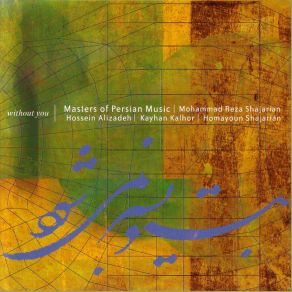Without You - Masters of Persian Music
Download links and information about Without You - Masters of Persian Music by Kayhan Kalhor, Hossein Alizâdeh / Hossein Alizadeh, Masters Of Persian Music, Homayoun Shajarian, Mohammad Reza Shajarian. This album was released in 2002 and it belongs to World Music genres. It contains 12 tracks with total duration of 01:15:02 minutes.

|
|
|---|---|
| Artist: | Kayhan Kalhor, Hossein Alizâdeh / Hossein Alizadeh, Masters Of Persian Music, Homayoun Shajarian, Mohammad Reza Shajarian |
| Release date: | 2002 |
| Genre: | World Music |
| Tracks: | 12 |
| Duration: | 01:15:02 |
| Buy it NOW at: | |
| Buy on iTunes $9.99 | |
| Buy on Amazon $8.99 | |
Tracks
[Edit]| No. | Title | Length |
|---|---|---|
| 1. | Daramad (Instrumental) | 7:41 |
| 2. | Saz Va Avaz: Bee Hamegaan (Mowlavi) | 8:55 |
| 3. | Saz Va Avaz (Nahoft) | 7:29 |
| 4. | Tasnif: Ba Man Sanama (Mowlavi) | 8:23 |
| 5. | Zarbi | 5:09 |
| 6. | Chahar Mezrab | 3:00 |
| 7. | Saz Va Avaz: Rah-E Mey Khaneh O Masjed Kodamast? (Attar) | 6:18 |
| 8. | Chandan Keh Goftam (Hafez) | 4:18 |
| 9. | Zarbi: Bayat-E Kord - Tasnif: Del-E Divaneh (Baba Taher) | 8:47 |
| 10. | Foroud | 1:03 |
| 11. | Avaz Masnavi: Chon To Janan-E Mani (Attar) | 7:12 |
| 12. | Tasnif: Bee Hamegaan (Mowlavi) | 6:47 |
Details
[Edit]Persian classical music isn't a dying form, thankfully. In fact, in the hands of the Masters of Persian Music, you could say it's flourishing. This live recording (no details of when or where, sadly) is a testament to the power of these musicians and singers, all of whom are true virtuosos. In its entirety, the music here is in the mode of dastgah nava, akin to a minor scale, now one of the more popular modes for performance and improvisation. Typical of more contemporary Iranian classical performance, the instruments and voice take an equal role (it used to be that an instrument was subordinate to the voice), with plenty of stunning improvisations on the lute-like tar and the ancient spike fiddle known as the kamencheh. And while choral and harmony singing are unknown in the tradition, here the two singers — father and son — aren't afraid to have one voice following the other; in turn, the two instruments work with each other, rather than individually, playing in unison, backing each other, offering antiphonal phrases. It's inevitable, though, that a number of the pieces in the performance are songs (with Mohammad Reza Shajarian in the group, an Iranian national treasure, how could it be otherwise?), and the lyrics, as virtually always in classical music, are taken from the great Sufi poets of history, with their aches of holy desire. The result is far more than the sum of its parts, breathtakingly good in execution, gorgeous in its breadth. Wonderful.